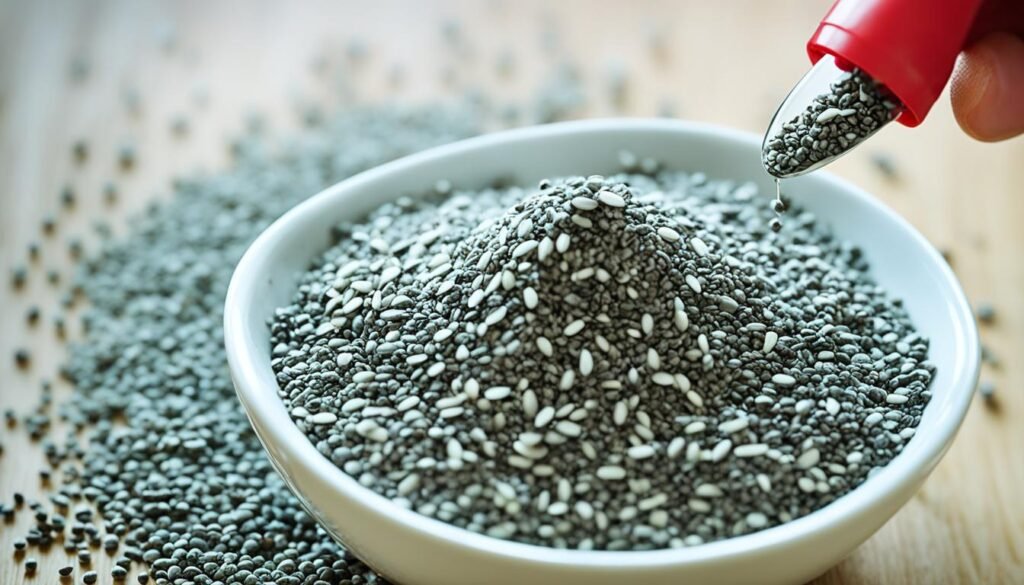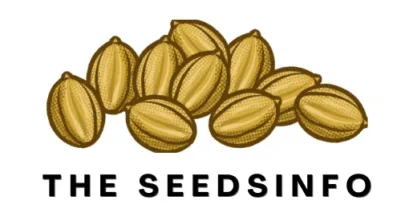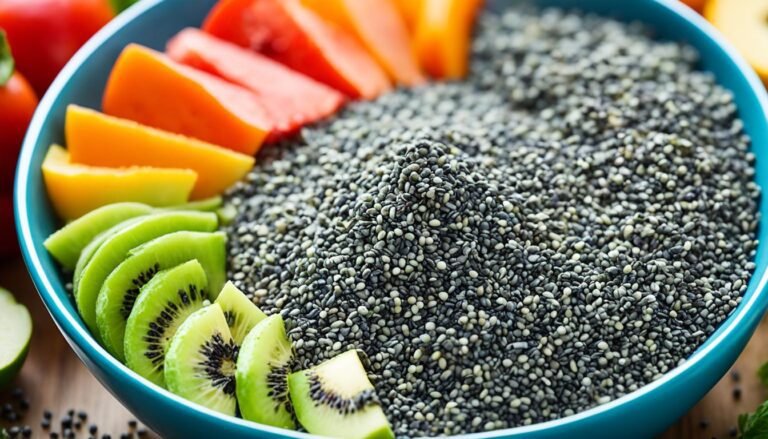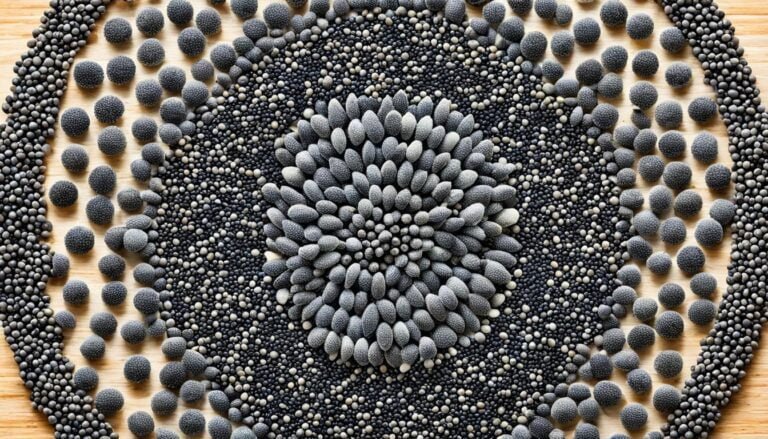Chia Seeds Nutrition: Tiny Seeds, Big Benefits

One ounce (28 grams) of chia seeds is packed with nutrition. It has 138 calories, 4.7 grams of protein, 8.7 grams of fat, and 5 grams of alpha-linolenic acid (ALA). You’ll also find 11.9 grams of carbs and 9.8 grams of fiber. These small seeds are a giant in nutrition, full of vitamins, minerals, and antioxidants.
Chia seeds come from Central America and were key in the diets of the Aztec and Maya. They are gluten-free and full of nutrients like omega-3 fatty acids, fiber, and protein. Adding them to your diet can help with heart health, blood sugar control, and increase nutrient intake. Chia seeds are a great choice for anyone looking to improve their health.
What are Chia Seeds?
Ancient Superfood with Modern Benefits
Chia seeds come from Central America and were key in the diets of ancient Aztec and Mayan people. These small seeds were known for their nutrition and were used in medicine, rituals, and beauty products. Now, chia seeds are loved around the world for their health benefits. They are packed with fiber, protein, omega-3s, antioxidants, and minerals, making them a superfood.
Chia seeds are easy to add to many foods and drinks. You can sprinkle them on salads, yogurt, or oatmeal, or mix them into smoothies. They also work well in baked goods or as a base for chia seed pudding. Their mild taste and crunchy texture make them a favorite among those looking to eat healthier.
A 2.5-tablespoon serving of chia seeds has 140 calories, 5 grams of protein, 10 grams of fiber, and 9 grams of healthy fats. They are full of vitamins and minerals like calcium, iron, magnesium, and phosphorus. Adding chia seeds to your meals can help with digestion, weight control, heart health, and blood sugar levels.
If you want to increase your nutrient intake, improve your health, or just enjoy a tasty ingredient, chia seeds are a great pick. Discover how to add these superfood gems to your daily meals and enjoy their modern benefits.
Chia Seeds Nutrition: A Nutrient Powerhouse
Chia seeds are a superfood packed with essential nutrients. One ounce (28 grams) has 138 calories, 4.7 grams of protein, 8.7 grams of fat, 5 grams of alpha-linolenic acid (ALA), 11.9 grams of carbs, and 9.8 grams of fiber.
Chia seeds are also full of micronutrients. They give you 14% of the daily value for calcium, 12% for iron, 23% for magnesium, 20% for phosphorus, 12% for zinc, 15% for vitamin B1, and 16% for vitamin B3.
This amazing nutrient profile makes chia seeds a superfood. They offer a wide range of macronutrients and micronutrients. These nutrients are great for your health and well-being.
| Nutrient | Amount per 1 oz (28g) Serving | % Daily Value |
|---|---|---|
| Calories | 138 | – |
| Protein | 4.7g | – |
| Fat | 8.7g | – |
| Carbohydrates | 11.9g | – |
| Fiber | 9.8g | 35% |
| Calcium | 177mg | 14% |
| Iron | 2.2mg | 12% |
| Magnesium | 95mg | 23% |
| Phosphorus | 265mg | 20% |
| Zinc | 1.1mg | 12% |
| Vitamin B1 (Thiamine) | 0.2mg | 15% |
| Vitamin B3 (Niacin) | 0.6mg | 16% |
The chia seeds nutrition profile is amazing. It’s full of macronutrients and micronutrients. These tiny seeds are a nutrient powerhouse that supports your health and well-being.

High in Fiber and Protein
Chia seeds are packed with fiber and protein, great for managing weight. One ounce (28 grams) has 9.8 grams of fiber, close to the daily goal. This fiber helps you feel full, which can lead to eating less and losing weight.
Chia seeds also offer 4.7 grams of protein per ounce. This protein helps you stay full and keeps your muscles strong while losing weight. Together, fiber and protein in chia seeds make them a key part of a healthy diet.
A Winning Combination for Weight Management
The chia seeds fiber and chia seeds protein support your weight management goals. Fiber keeps you feeling full, which can cut down on calories. Protein helps keep your muscles strong while you lose weight. This combo makes chia seeds perfect for staying healthy or losing weight.
Adding chia seeds to your meals can help with satiety and weight management. Their high fiber and protein make them a great choice for a healthy lifestyle.
Chia Seeds Nutrition: Omega-3 Fatty Acid Superstars
Chia seeds are packed with omega-3 fatty acids, especially alpha-linolenic acid (ALA). About 75% of their fat is ALA, a key plant-based omega-3. These fats are known for fighting inflammation and helping heart health.
Even though the ALA in chia seeds needs to change into EPA and DHA, they are a top plant-based omega-3 source. Eating chia seeds can up your ALA levels and help with a better omega-6 to omega-3 ratio. This ratio is linked to less inflammation and a lower risk of chronic diseases.
Chia seeds are true omega-3 powerhouses, providing a substantial amount of this essential fatty acid in a convenient, plant-based form.
- Chia seeds have over 60% of their fat as omega-3 fatty acids, giving you 5000mg of omega-3 in each ounce.
- Salmon has 2440mg of omega-3 in each ounce, less than chia seeds.
- One ounce of chia seeds also gives you 20% of the Daily Value (DV) for magnesium, 20% for phosphorus, 15% for calcium, and 10% for iron.
Adding chia seeds to your meals is an easy way to get more omega-3s. This can help your heart, reduce inflammation, and keep you healthy. With their many benefits and versatility, chia seeds are a superfood you should eat every day.

Antioxidant Powerhouses
Chia seeds are more than just a nutritional powerhouse; they’re a great source of antioxidants. These small seeds are full of compounds that fight off free radicals and oxidative stress. These are key factors in aging and chronic diseases like cancer.
Chia seeds have chlorogenic acid, caffeic acid, myricetin, quercetin, and kaempferol as antioxidants. These compounds protect the seeds’ fats from going bad, keeping them fresh and nutritious. They also help the human body in many ways.
Studies show that chia seeds’ antioxidant content can protect the heart, liver, and other organs. They may also have anticancer properties. By fighting free radicals and lowering oxidative stress, chia seeds support cell health. This could lower the risk of chronic diseases.
Adding chia seeds to your meals is simple to increase your antioxidant intake. You can put them on oatmeal, blend them into smoothies, or use them as a topping for salads and yogurt. These small seeds are a big help for your health and well-being.
Potential Benefits for Heart Health
Fiber, Omega-3s, and More
Chia seeds are packed with fiber and omega-3s, which could be good for heart health. The fiber in them can lower bad cholesterol, which is a risk factor for cardiovascular disease. Chia seeds also have a lot of alpha-linolenic acid (ALA), an omega-3 fatty acid. This has been shown to lower the risk of heart disease.
Some studies also suggest that chia seeds can help lower blood pressure in people with high blood pressure. This could reduce the risk of cardiovascular complications. While we need more research, chia seeds are full of fiber, omega-3s, and other good stuff. They could be a great choice for a heart-healthy diet.
- Chia seeds are rich in fiber, which can help lower cholesterol levels and reduce the risk of heart disease.
- The omega-3 fatty acids in chia seeds have been linked to a decreased risk of heart disease.
- Some studies have suggested that chia seeds may help lower blood pressure in people with hypertension.
- The unique nutrient profile of chia seeds makes them a potentially heart-healthy addition to the diet.

Studies show that being overweight can affect the cardiovascular system. Chia seeds, with their high fiber and omega-3s, could help with heart health. They can manage cholesterol levels, blood pressure, and other risks for cardiovascular disease.
Blood Sugar Regulation
Are you worried about keeping your blood sugar levels healthy? Chia seeds might be just what you need. They are small but powerful in helping to control blood sugar and boost insulin sensitivity. These are key for managing type 2 diabetes and keeping your metabolic health in check.
Research shows that a 1 oz mix of chia seeds and water can lower blood sugar by up to 39%. The fiber and protein in chia seeds help control blood sugar spikes after meals. In fact, breads with chia seeds cause a smaller rise in blood sugar than regular breads. This means chia seeds could help keep your blood sugar stable.
Chia seeds are also packed with omega-3 fatty acids, which improve insulin sensitivity. Studies on animals show that chia seeds can make insulin work better and keep blood sugar steady. This makes them a great choice for people with type 2 diabetes and those looking to boost their metabolic health.
If you want to help your body manage blood sugar, try adding chia seeds to your meals and snacks. They can help control spikes in glucose after eating and might even make your body more sensitive to insulin. Chia seeds are a tasty and easy way to support your chia seeds blood sugar and metabolic health.

Easy to Incorporate into Your Diet
Chia seeds are easy to add to many dishes and recipes. They have a mild taste that doesn’t change the flavor much. You can eat them raw, mix them into smoothies, or add them to yogurt or oatmeal.
They’re also great as an egg substitute in baking. Or, you can make a gel-like pudding with them. Chia seeds are perfect for thickening sauces and dressings too.
Adding chia seeds to your meals is easy and healthy. They boost fiber, protein, and omega-3 levels. Chia seeds are a great choice for anyone wanting to eat better.
Chia seeds fit well into many recipes because of their mild taste. They’re perfect for smoothies, salads, baked goods, and drinks. Adding chia seeds to your diet can help improve your health and wellness.
FAQ
What are chia seeds and what are their benefits?
Chia seeds are tiny black or white seeds from the plant Salvia hispanica L. They come from Central America. In the past, the Aztec and Maya ate them a lot. Chia seeds are full of nutrients and help with heart health and blood sugar control.
What is the nutrient profile of chia seeds?
Chia seeds are full of important nutrients. One ounce has 138 calories, 4.7 grams of protein, 8.7 grams of fat, and 5 grams of omega-3 fatty acids. They also have 11.9 grams of carbs, 9.8 grams of fiber, and lots of minerals like calcium and iron.
How can chia seeds benefit weight management?
Chia seeds are very high in fiber and protein, which helps with weight control. The fiber makes you feel full, which can lead to eating less and losing weight. The protein also helps you feel full and keeps muscle while losing weight.
What are the benefits of the omega-3 fatty acids in chia seeds?
Chia seeds are a great source of omega-3 fatty acids, especially alpha-linolenic acid (ALA). Most of their fat is ALA, a plant-based omega-3. Omega-3s fight inflammation and are good for the heart.
What antioxidants are found in chia seeds?
Chia seeds are packed with antioxidants like chlorogenic acid and quercetin. These antioxidants fight off harmful free radicals and reduce stress that can lead to aging and diseases like cancer.
How can chia seeds benefit heart health?
Chia seeds can help your heart in many ways. Their fiber and omega-3s can lower bad cholesterol and reduce the risk of heart disease. This makes them a great choice for heart health.
Can chia seeds help regulate blood sugar levels?
Yes, chia seeds may help control blood sugar and improve insulin sensitivity. Their fiber and protein can help manage blood sugar levels. This makes them a good food for those with diabetes or those who want to keep their blood sugar stable.
How can I incorporate chia seeds into my diet?
Chia seeds are easy to add to your meals because they taste neutral. You can eat them raw, mix them into smoothies, or add them to yogurt or oatmeal. They’re also great as an egg substitute in baking and for thickening sauces.






